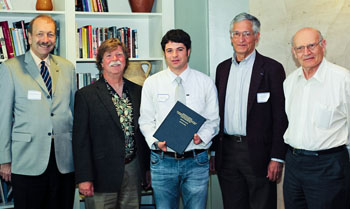Campus News
Steck Award winner shares stories of survival
Kristoffer Hellén traveled to Europe and Russia, to find out why two small and vulnerable ethnic groups resist assimilation, hold onto their cultures, and survive. Now he is being recognized with one of UCSC’s highest undergraduate honors.


Kristoffer Hellén traveled to Europe and Russia, seeking answers to a difficult question: how did two small and vulnerable ethnic groups resist assimilation, hold onto their cultures, and survive?
Hellén (Cowell fall ’13, history), 26, wanted to find out how two groups—the Estonians and the Maris—preserved their heritage in spite of, and in some sense, because of, living in places where cultures and religions clash and converge.
“Everyone likes a good survival story,” Hellén said.
Now, UC Santa Cruz is honoring Hellén with the 2013 Steck Family Award, which recognizes the best senior thesis completed in the academic year. It is the highest academic honor given to a UCSC undergraduate for a senior research project. Steck winners are chosen from a pool of 15 Chancellor’s Award winners.
Loren Steck (Porter ’73), a UC Santa Cruz Foundation trustee, was on hand to congratulate Hellén. Steck chairs the distinguished selection committee that chose to recognize Hellén’s work. The Steck family created the endowment that funds the award, which includes a $1,000 prize.
Steck has described the award as a truly special honor for UCSC students: “Only the best undergraduates nowadays do senior theses,” Steck said. “Only the best of the best of them receive Dean’s Awards. Only the best of the best of the best of them get Chancellor’s Awards.”
Hellén transferred from Cabrillo College to UCSC during his junior year, was drawn to the Mari, a small ethnic group in Russia, whom he describes as “the mysterious cousins of the Finns.” He felt a sense of kinship, considering that he is of Finnish ancestry.
The Mari are a Finno-Ugric people whose language is related to Finnish.
The Mari also happen to be the only animists in Europe. They are, literally, nature worshippers who pray in sacred natural areas. But the Mari live in constant close contact with people with dramatically different beliefs, including Muslims.
“They can identify themselves against them because they go to sacred natural sites to pray, instead of mosques,” said Hellén.
Consequently the Mari have a sharpened sense of community, which also helped them reject the Orthodox Christianity — the dominant religion of the Russian state.
But their location, though it figures in their long-term survival story, is not exactly a stroke of luck. The Mari have a history of intense persecution—about half of the group was wiped out during the so-called Cheremis Wars in the 16th century, and entire Mari villages were later driven into rivers and forcibly baptized in the 18th century.
And their latest foe—assimilation—has reduced their numbers over the years.
Hellén, who wrote about his travels in History Matters, a UCSC History Department e-journal, was a bit nervous about visiting and studying them at first. “I just didn’t know what to expect.” But he also felt a sense of urgency: “This was my chance to go. Somebody had agreed to host me. I had to go there right away …”
Now Hellén is earning high praise for his work. History professor Jonathan Beecher drew attention to his “excellent writing” as well as the sheer originality of his thesis. “I would simply say that Hellén goes far beyond the existing scholarship,” wrote Beecher in a letter of recommendation for the prize.
Gail Hershatter, distinguished professor of history and History Department chair, has also been singing his praises.
“This is the kind of undergraduate humanities research we really like to encourage. We try to make it possible for students to do these projects and share them with others and to recognize them. We are just so full of pride” about Hellén’s work.
Hellén said he hopes the Steck Award leads more people to read his thesis. He says he wants to help the Maris be proud of their history and heritage, and to raise awareness of this ethnic group.
This week, he returns to Finland, where he is going to attend a three-week Mari language program in Yoshkar-Ola and then a four-week Russian language program in Kazan.
Read more for a full list of Dean’s and Chancellor’s Award winners.